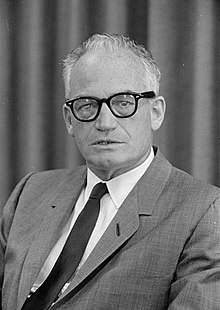Rick Perlstein
| Rick Perlstein | |
|---|---|
 Rick Perlstein at a piano, selecting music to play from a book of jazz standards, Chicago, March 2013. | |
| Born | September 3, 1969 (age 49) |
| Education |
University of Chicago (B.A., 1992) University of Michigan (M.A.)[1] |
| Occupation | Writer |
Eric S. "Rick" Perlstein (born September 3, 1969) is an American historian and liberal journalist[2] who has garnered recognition for his chronicles of the 1960s and 1970s, and the American conservative movement.[3] The author of three bestselling books, Perlstein received the 2001 Los Angeles Times Book Prize for his first book, Before the Storm: Barry Goldwater and the Unmaking of the American Consensus.[4] Politico has dubbed him "a chronicler extraordinaire of modern conservatism."[2]
Early life and education
Perlstein was born in Milwaukee, Wisconsin to a Reform Jewish family, the third child of Jerold and Sandra (née Friedman) Perlstein.[5][6] His father ran Bonded Messenger Service, a delivery company founded by his grandfather in 1955. Perlstein grew up in the Bayside and Fox Point neighborhoods of suburban Milwaukee, taking cross country trips with his parents and siblings to national landmarks like Mount Rushmore and Yellowstone National Park.[7] In high school, upon earning his driver's license, Perlstein would head to Renaissance Books in downtown Milwaukee, and spend hours in its basement among stacks of old magazines from the 1960s. He later recounted in an interview: "I ended up getting my own archive on the 1960s culture wars. That's where it started."[8] He also wrote in Rolling Stone: "A sixties obsessive since childhood, I misspent my teenage years prowling a ramshackle five-story used-book warehouse that somehow managed . . . to stay one step ahead of Milwaukee, Wisconsin's building inspectors."[9] Following graduation from Nicolet High School, Perlstein attended the University of Chicago, earning a B.A. in History in 1992.[10] While at the University of Chicago – years Perlstein described as "delightfully noisy and dissident", and a stark contrast to the suburbia of his youth, which "felt like a jail" – he was able to engage with and catch neighborhood jam sessions.[11]
Early career
After graduate study in American studies at the University of Michigan, Perlstein moved to New York in 1994, settling in the Park Slope neighborhood of Brooklyn.[12] While in New York, Perlstein interned at Lingua Franca, a magazine about academic and intellectual life, where he would become an associate editor.[13] Perlstein also began writing book reviews, for publications like The Nation and Slate.[14][15] It was Perlstein's 1996 Lingua Franca essay "Who Owns the Sixties?" that won him public notice, by exposing the emerging chasm between older and younger historians.[16] The essay also aroused the attention of a literary agent and soon after earned him a grant from the National Endowment for the Humanities.[13]

Chronicle of modern American conservatism
By 2015, Perlstein had published three notable books on the subject of modern American conservatism.
Before the Storm (2001)
In 1997, Perlstein began work on a history of the rise of Barry Goldwater, a transformative event for the conservative movement. Perlstein's book, Before the Storm: Barry Goldwater and the Unmaking of the American Consensus, was released in 2001 to widespread acclaim, including a laudatory New York Times review by William Kristol, editor of the conservative Weekly Standard. Kristol wrote of Before the Storm, "It's an amazing story, and Perlstein, a man of the left, does it justice."[17] Perlstein won the 2001 Los Angeles Times Book Prize in History.[18] Soon after, Perlstein moved from New York to Chicago. From 2003 to 2005, Perlstein was the Village Voice's national political correspondent, and contributed articles to publications that included the New York Times, The New Republic and The American Prospect.
Beginning in spring 2007 through 2009 Perlstein was a Senior Fellow at the Campaign for America's Future where he wrote for its blog The Big Con about the failures of conservative governance. A co-director at the Campaign for America's Future once noted, "Rick was unique. … I don't know when he sleeps."[19][20][21]
_1968.png)
Nixonland (2008)
In May 2008, Perlstein's Nixonland: The Rise of a President and the Fracturing of America was published to rave reviews.[22][23][24][25][26][27] In his review, the conservative columnist George Will credited Perlstein having "a novelist's, or perhaps an anthropologist's, eye for illuminating details" and called Nixonland "compulsively readable."[28] At the end of 2008, The New York Times included Nixonland among its notable books.[29] In 2009, The A.V. Club included it among the best books of the decade.[30]
The Invisible Bridge (2014)

In August 2014, Simon & Schuster published The Invisible Bridge: the Fall of Nixon and the Rise of Reagan. In his New York Times review, Frank Rich wrote that the tome was "a Rosetta stone for reading America and its politics today."[31] The Invisible Bridge received favorable reviews from The New Yorker, Slate, and The Washington Post among others.
Controversy
Perlstein's 2014 book The Invisible Bridge received "sharp criticism from some scholars and commentators who accuse Mr. Perlstein of sloppy scholarship, improper attribution and plagiarism," The New York Times reported. Conservative author and historian Craig Shirley alleged that Perlstein stole distinctive words and phrasing from Reagan's Revolution.[32] Perlstein's supporters regarded the criticism as a partisan attack. Responding to numerous complaints, Times public editor Margaret Sullivan dismissed the plagiarism allegations as a "smear" and criticized the reporting for "conferr[ing] a legitimacy on the accusation it would not otherwise have had."[33]
Responding to letters from Shirley and his attorneys, Perlstein's publisher, Simon and Schuster, stated that the claims of plagiarism "ignored the most basic principle of copyright law." Those same letters from Shirley's attorneys demanded that Simon and Schuster pay Shirley $25 million in damages, pulp all copies of The Invisible Bridge and take out ads of apology in various publications. If these demands weren't met, the letters promised that a lawsuit would be filed on July 30, 2014, nearly a week before the book was to be released on August 5. However, as of August 8, 2014 there was no evidence a lawsuit had ever been filed.[34] For his part, Perlstein said, "Mr. Shirley has sued me for $25 million and tried to keep people from reading my book; I've told everyone to read his book."[35]
In The Atlantic Monthly, Sam Tanenhaus wrote that The Invisible Bridge demonstrated that "Perlstein’s gift for energetic caricature and his taste for bizarre incidents have overpowered his impulse to sift through the ideas and beliefs that animate his subjects, and to grapple seriously with a politics rooted in authentic if not always coherent dissent."[36] But in a front-page review in the New York Times Book Review, Frank Rich said it "persuasively portrays this sulky, slender interlude between the fall of Nixon and the rise of Reagan (as his subtitle has it) not just as a true bottom of our history but also as a Rosetta stone for reading America and its politics today." [37]
Publications
- Perlstein, Rick (2001). Before the Storm: Barry Goldwater and the Unmaking of the American Consensus. New York: Hill and Wang. ISBN 0-8090-2859-X.
- Perlstein, Rick; et al. (2005). The Stock Ticker and the Superjumbo: How the Democrats Can Once Again Become America's Dominant Political Party. Chicago: Prickly Paradigm. ISBN 0-9761475-0-5.
- Perlstein, Rick (2008). Nixonland: The Rise of a President and the Fracturing of America. New York: Scribner. ISBN 0-7432-4302-1.
- Perlstein, Rick (2014). The Invisible Bridge: The Fall of Nixon and the Rise of Reagan. New York: Simon & Schuster. ISBN 978-1-4767-8241-6.
See also
References
- ↑ "Rick Perlstein." Contemporary Authors Online. Farmington Hills, MI: Gale, 2015. Retrieved via Biography in Context database, 2017-05-03.
- 1 2 Coolican, J. Patrick (2008-05-15). "Historian bridges left-right divide". Politico. Retrieved 2015-11-05.
- ↑ Packer, George (2014-08-11). "The Uses of Division: Rick Perlstein chronicles the fall of the American consensus and the rise of the right". The New Yorker. Retrieved 2017-05-03.
- ↑ "Book Prizes – 2001 Los Angeles Times Book Prizes Winners". Los Angeles Times. Archived from the original on 2015-11-21. Retrieved 2015-11-04.
- ↑ Perlstein, Rick (2012-05-02). "On the Crisis of Zionism". Rolling Stone. Retrieved 2015-12-23.
- ↑ "Obituary: Jerold Irving Perlstein | SummitDaily.com". The Summit Daily. Retrieved 2015-11-05.
- ↑ "Perlstein planned, traveled and pursued everything he loved". www.jsonline.com. Retrieved 2015-11-05.
- ↑ Saltoun-Ebin, Jason (2014-08-05). "'The Invisible Bridge': 10 or So Questions with Rick Perlstein". The Huffington Post. Updated 2014-10-05. Retrieved 2015-11-04.
- ↑ Perlstein, Rick (2012-03-16). "Why Conservatives Are Still Crazy After All These Years. Rolling Stone. rollingstone.com. Retrieved 2017-05-04.
- ↑ "Rick Perlstein". Huffpost. huffingtonpost.com. Retrieved 2015-11-04.
- ↑ "The New York Times Magazine College Essay Contest". New York Times. Retrieved 2015-11-04.
- ↑ Steininger, Judith. "Books – Mequon native Rick Perlstein". Greater Milwaukee Today. www.gmtoday.com. Retrieved 2015-11-04.
- 1 2 Adams, Lucas (2014-06-20). "Reagan Rising: Rick Perlstein". Publishers Weekly. publishersweekly.com. Retrieved 2015-11-04.
- ↑ Perlstein, Rick (1996-03-04). "Infinite Jest". The Nation. Retrieved 2015-11-04 – via HighBeam Research. highbeam.com.
- ↑ Perlstein, Rick (1997-11-05). "Boston vs. Austin". Slate. ISSN 1091-2339. Retrieved 2015-11-05.
- ↑ Warren, James (1996-05-24). "Historians Duke It Out Over The '60s". Chicago Tribune. chicagotribune.com. Retrieved 2015-11-04.
- ↑ "In His Heart, He Knew He Was Right". www.nytimes.com. Retrieved 2015-11-05.
- ↑ "Book Prizes – Los Angeles Times Festival of Books» Winners By Award". Los Angeles Times. Archived from the original on 2013-04-05. Retrieved 2015-11-05.
- ↑ Rick Perlstein Biography, Huffington Post
- ↑ Biography, Campaign for America's Future
- ↑ Henderson, Harold. "Sympathy for the Devil?". Chicago Reader. Retrieved 2015-11-05.
- ↑ "The Fall of Conservatism". The New Yorker. Retrieved 2015-11-05.
- ↑ "Our favorite books of 2008". The AV Club. Retrieved 2015-11-05.
- ↑ "Rick Perlstein: Nixonland". The AV Club. Retrieved 2015-11-05.
- ↑ "E Pluribus Nixon". The Atlantic. Retrieved 2015-11-05.
- ↑ "A Nation Divided In 'Nixonland'". NPR.org. Retrieved 2015-11-05.
- ↑ "Rick Perlstein's 'Nixonland': A Gripping Look at the Nixon Era". The Nation. ISSN 0027-8378. Retrieved 2015-11-05.
- ↑ Will, George F. (2008-05-11). "Bring Us Apart". The New York Times. ISSN 0362-4331. Retrieved 2015-11-05.
- ↑ "100 Notable Books of 2008". The New York Times. 2008-12-07. ISSN 0362-4331. Retrieved 2015-11-05.
- ↑ "The best books of the '00s". The AV Club. Retrieved 2015-11-05.
- ↑ Rich, Frank (2014-07-31). "'The Invisible Bridge,' by Rick Perlstein". The New York Times. ISSN 0362-4331. Retrieved 2015-11-05.
- ↑ https://www.nytimes.com/2014/08/05/business/media/rick-perlsteins-the-invisible-bridge-draws-criticism.html
- ↑ Sullivan, Margaret (2014-08-12). "Was an Accusation of Plagiarism Really a Political Attack?". New York Times. Retrieved 2017-04-30.
- ↑ https://www.techdirt.com/articles/20140807/09270928138/reagan-biographer-claims-copyright-infringement-because-another-biographer-used-same-facts.shtml
- ↑ "The Paris Review Toasts Rick Perlstein's New Book, The Invisible Bridge". Observer. Retrieved 2015-11-05.
- ↑ https://www.theatlantic.com/magazine/archive/2014/09/the-gonzo-historian/375059/
- ↑ https://www.nytimes.com/2014/08/03/books/review/the-invisible-bridge-by-rick-perlstein.html?_r=0/